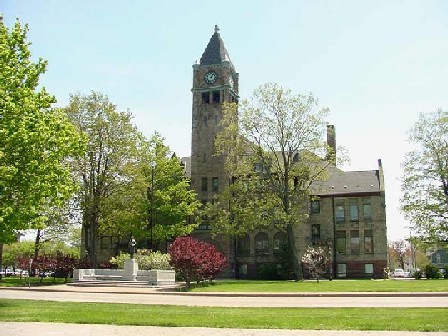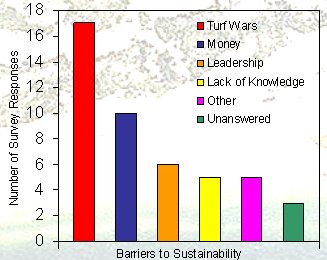Sustainable Muskegon Metro - Survey Results


Developing a Sustainable Strategy for the City of
Muskegon and its Urban Area
Synopsis
Background Information Preliminary Survey Results
Additional Resources
Muskegon Area Sustainability Coalition
The Need Indicated By Stakeholders
We have involved a great many stakeholders in our project during the last year. Our preliminary results from a survey of 81 organizations has revealed that government and non-profit organizations far outweigh the private sector and education components in the debate about sustainability for the Muskegon community. While we have no means to compare this result with similar surveys or evidence in the Grand Rapids area, the sense is that drivers for involvement are much different. The Grand Rapids area seems to involve the support of many more business and educational interests. Our proposed project will as a consequence attempt to increase participation and support from these influential groups.
Our survey also revealed that the major barriers to sustainability in the Muskegon region are "turf" wars and funding. Yet the survey results also indicate that the majority of those organizations responding had annual budgets of $1 million or more. This would indicate that while costs undoubtedly are a contributing factor in dealing with these issues, it is not the driving concern and indeed the need for inter-governmental cooperation is significant. Our proposal addresses this need directly as a long-term objective, and indirectly through the short-term objectives designed to foster such collaboration.
An ad hoc group of more than a 100 individuals calling themselves "One Muskegon" has been meeting on a semi-regular basis to discuss specifically the opportunity to collaborate between jurisdictions within Muskegon County. Hired as a consultant for this group is Mr. David Rusk, the former Mayor of Albuquerque, New Mexico, and author of the book titled, "City Without Suburbs". One-hundred and ten "topics" related to the issue of collaboration were offered by a subcommittee of the task force during a two hour "brainstorming" session. These topics were later divided into 6 separate categories including: Economic Viability, Social Equity, Public Involvement, Healthy Environment, Government Issues, and Process. Discussion relative to these topic areas continues and is something that would be accounted for in the objectives being considered in this proposal.
